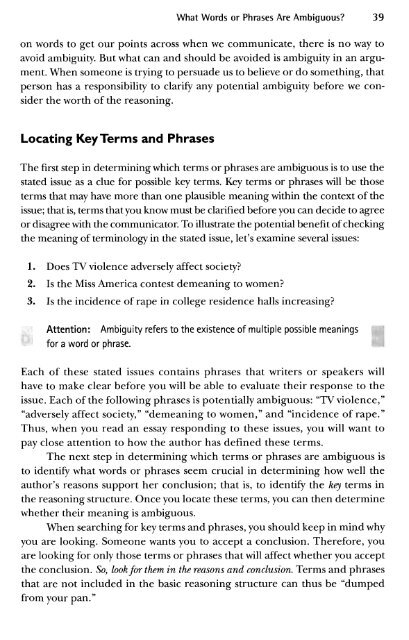Asking the Right Questions, A Guide to Critical Thinking, 8th Ed
Asking the Right Questions, A Guide to Critical Thinking, 8th Ed
Asking the Right Questions, A Guide to Critical Thinking, 8th Ed
Create successful ePaper yourself
Turn your PDF publications into a flip-book with our unique Google optimized e-Paper software.
What Words or Phrases Are Ambiguous? 39<br />
on words <strong>to</strong> get our points across when we communicate, <strong>the</strong>re is no way <strong>to</strong><br />
avoid ambiguity. But what can and should be avoided is ambiguity in an argument.<br />
When someone is trying <strong>to</strong> persuade us <strong>to</strong> believe or do something, that<br />
person has a responsibility <strong>to</strong> clarify any potential ambiguity before we consider<br />
<strong>the</strong> worth of <strong>the</strong> reasoning.<br />
Locating Key Terms and Phrases<br />
The first step in determining which terms or phrases are ambiguous is <strong>to</strong> use <strong>the</strong><br />
stated issue as a clue for possible key terms. Key terms or phrases will be those<br />
terms that may have more than one plausible meaning within <strong>the</strong> context of <strong>the</strong><br />
issue; that is, terms that you know must be clarified before you can decide <strong>to</strong> agree<br />
or disagree with die communica<strong>to</strong>r. To illustrate <strong>the</strong> potential benefit of checking<br />
<strong>the</strong> meaning of terminology in <strong>the</strong> stated issue, let's examine several issues:<br />
1. Does TV violence adversely affect society?<br />
2. Is <strong>the</strong> Miss America contest demeaning <strong>to</strong> women?<br />
3. Is <strong>the</strong> incidence of rape in college residence halls increasing?<br />
Attention:<br />
for a word or phrase.<br />
Ambiguity refers <strong>to</strong> <strong>the</strong> existence of multiple possible meanings<br />
Each of <strong>the</strong>se stated issues contains phrases that writers or speakers will<br />
have <strong>to</strong> make clear before you will be able <strong>to</strong> evaluate <strong>the</strong>ir response <strong>to</strong> <strong>the</strong><br />
issue. Each of <strong>the</strong> following phrases is potentially ambiguous: "TV violence,"<br />
"adversely affect society," "demeaning <strong>to</strong> women," and "incidence of rape."<br />
Thus, when you read an essay responding <strong>to</strong> <strong>the</strong>se issues, you will want <strong>to</strong><br />
pay close attention <strong>to</strong> how <strong>the</strong> author has defined <strong>the</strong>se terms.<br />
The next step in determining which terms or phrases are ambiguous is<br />
<strong>to</strong> identify what words or phrases seem crucial in determining how well <strong>the</strong><br />
author's reasons support her conclusion; that is, <strong>to</strong> identify <strong>the</strong> key terms in<br />
<strong>the</strong> reasoning structure. Once you locate <strong>the</strong>se terms, you can <strong>the</strong>n determine<br />
whe<strong>the</strong>r <strong>the</strong>ir meaning is ambiguous.<br />
When searching for key terms and phrases, you should keep in mind why<br />
you are looking. Someone wants you <strong>to</strong> accept a conclusion. Therefore, you<br />
are looking for only those terms or phrases that will affect whe<strong>the</strong>r you accept<br />
<strong>the</strong> conclusion. So, look for <strong>the</strong>m in <strong>the</strong> reasons and conclusion. Terms and phrases<br />
that are not included in <strong>the</strong> basic reasoning structure can thus be "dumped<br />
from your pan."



